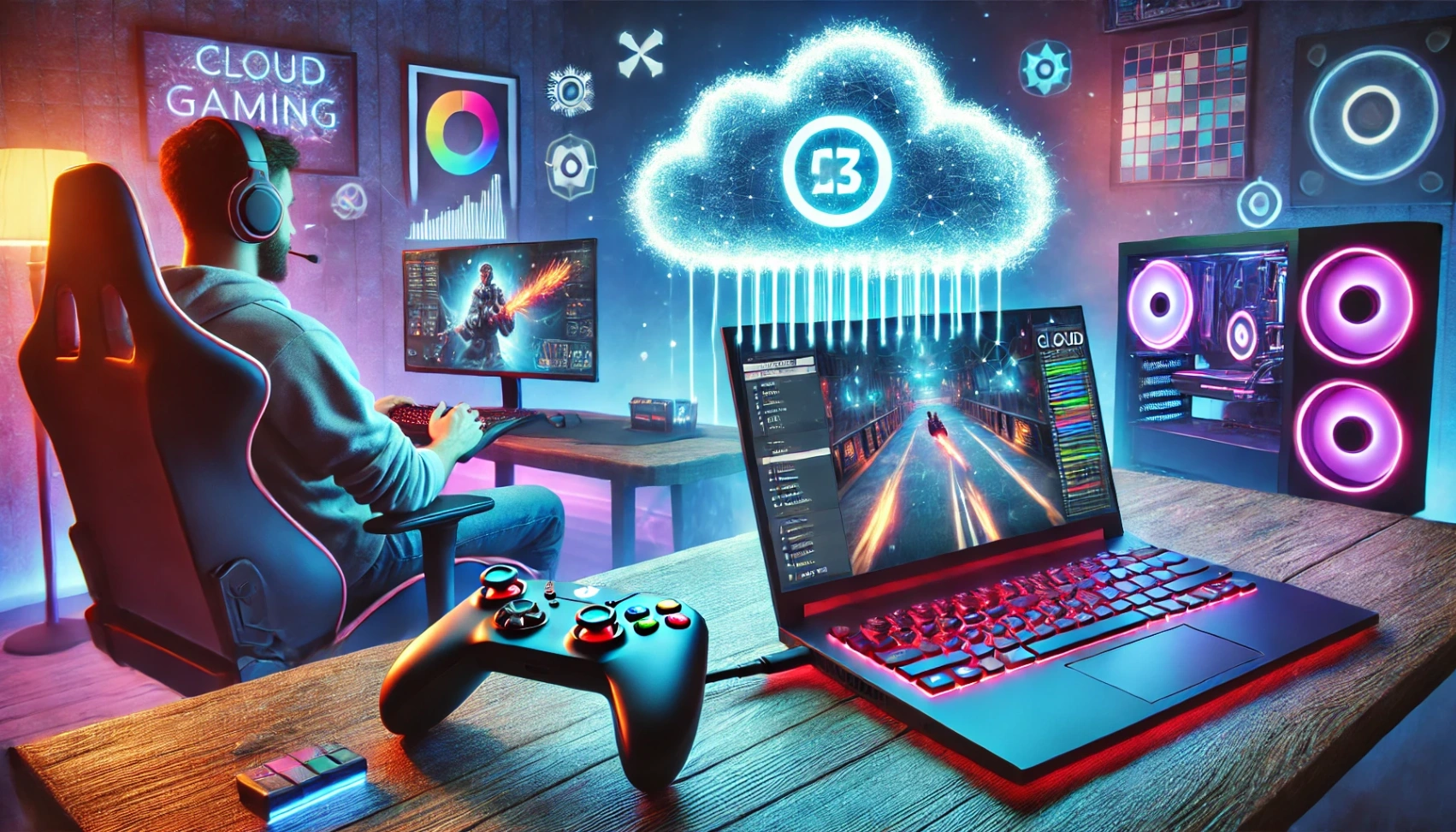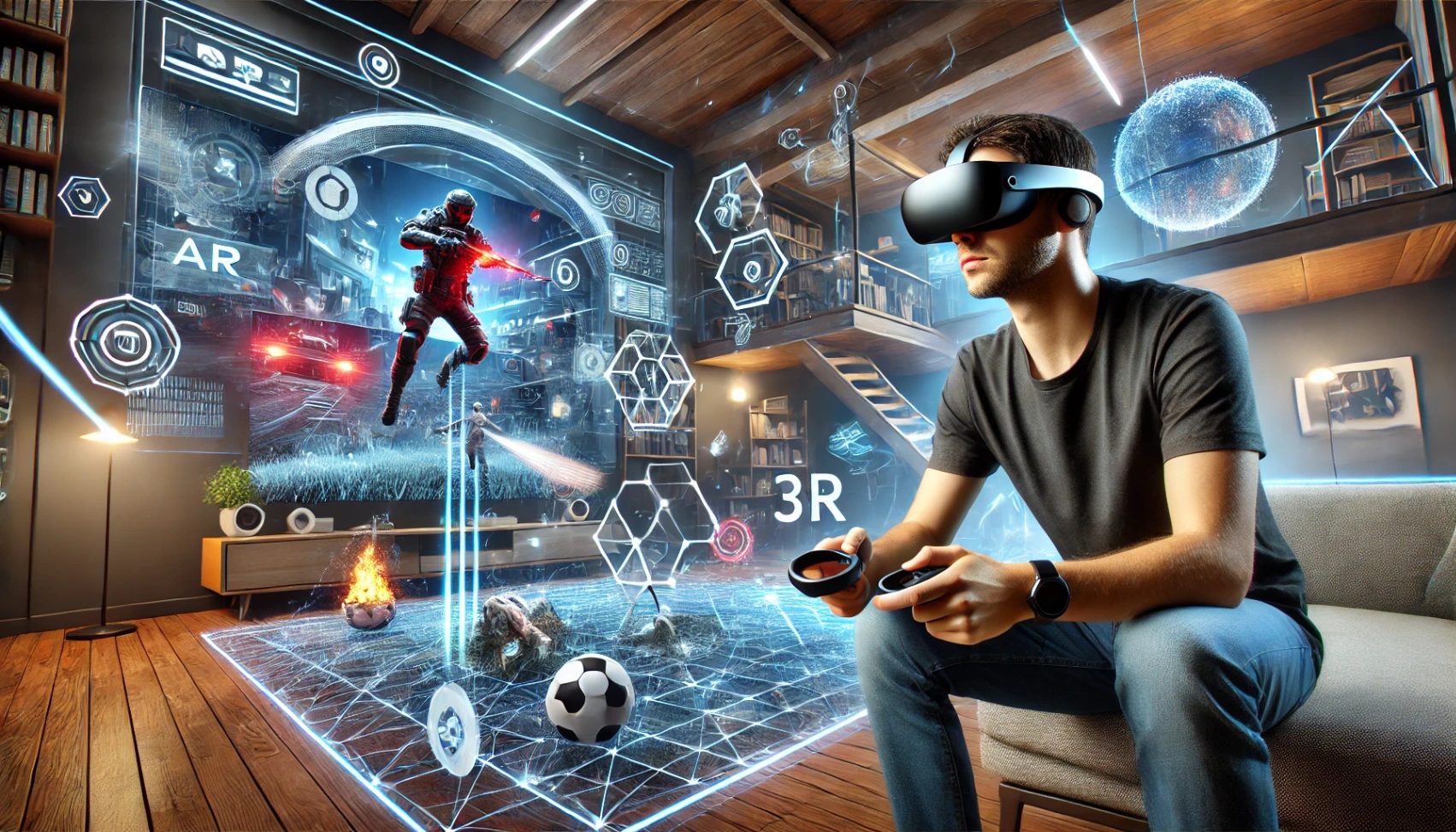The gaming industry has evolved from basic pixelated graphics to advanced, immersive experiences driven by innovative technology.
Virtual Reality (VR) transforms how players interact with games, while cloud gaming eliminates hardware limitations for greater accessibility.
This article examines how VR, cloud services, and other emerging trends, such as AI, blockchain, and augmented reality, are shaping the future of gaming.
Virtual Reality (VR)
Virtual Reality (VR) is transforming gaming with immersive, 3D environments that feel lifelike.
Advancements in hardware and software are making VR more accessible and redefining gameplay experiences.
Current State of VR Gaming
- Popular devices: Meta Quest, PlayStation VR, HTC Vive
- Immersive gameplay in simulation, adventure, and fitness genres
- Evolving VR platforms with social and multiplayer integration
Advantages of VR
- Provides an unparalleled level of immersion in gameplay
- Enhances storytelling through first-person perspectives
- Offers innovative use cases beyond gaming, like fitness and education
Challenges in VR Adoption
- High costs of VR headsets and required hardware
- Motion sickness and comfort issues during prolonged use
- Limited game libraries compared to traditional gaming platforms
Future of VR Gaming
- Integration of advanced haptic feedback for tactile experiences
- Development of lighter, more affordable headsets
- Growth in multiplayer VR, creating expansive virtual social worlds
- Potential use of AI for dynamic, adaptive gaming experiences

Cloud Gaming
Cloud gaming lets players stream games online without expensive hardware, offering convenience and expanding gaming accessibility.
How Cloud Gaming Works
- Hosting games on remote servers for internet streaming
- Real-time interaction with server-sent inputs and rendered outputs
- Leading platforms: NVIDIA GeForce NOW, Xbox Cloud Gaming, PlayStation Plus
Benefits of Cloud Gaming
- Eliminates the need for costly hardware upgrades
- Allows access to high-quality games on devices like smartphones, tablets, and low-end PCs
- Supports instant play without lengthy downloads or installations
Challenges of Cloud Gaming
- Requires fast, stable internet connections, limiting accessibility in areas with poor connectivity
- Latency issues affecting fast-paced games
- Cost concerns from subscription-based models
Future of Cloud Gaming
- Expansion of global server networks to reduce latency
- Partnerships with game developers for exclusive cloud-based titles
- Integration with VR and AR for immersive, streaming-based experiences
- Growth in mobile gaming markets fueled by cloud accessibility
Artificial Intelligence (AI) in Gaming
Artificial Intelligence (AI) transforms gaming with smarter characters, dynamic environments, and personalized gameplay for deeper player engagement.
Current Role of AI in Gaming
- Enhances Non-Player Characters (NPCs) with realistic behavior and interactions
- Powers procedural content generation, creating unique levels, maps, and quests
- Personalizes gameplay by adapting difficulty and mechanics based on player behavior
Benefits of AI in Gaming
- Provides more immersive and unpredictable game worlds
- Reduces development time through automated content generation
- Improves accessibility with tailored experiences for diverse players
Challenges of AI in Gaming
- High computational requirements can increase development costs
- Ethical concerns over manipulative AI-driven engagement tactics
- Balancing AI complexity with gameplay fairness in competitive settings
Future of AI in Gaming
- Development of AI companions with lifelike personalities and adaptive skills
- Expansion of AI-generated narratives that respond to player decisions in real-time
- Integration of AI to optimize multiplayer matchmaking and prevent cheating
- Use of AI for virtual reality (VR) and augmented reality (AR) applications, enhancing immersion

Augmented Reality (AR)
Augmented Reality (AR) merges digital elements with the real world, delivering interactive gaming through mobile devices and wearable tech.
Current Role of AR in Gaming
- Popular games like Pokémon GO and Ingress
- Smartphone cameras and GPS for real-world integration
- Virtual elements overlaid on physical objects in board and card games
Benefits of AR Gaming
- Combines physical activity and gaming, encouraging movement and exploration
- Bridges the gap between digital and physical play for unique experiences
- Accessible through everyday devices like smartphones and tablets
Challenges of AR Gaming
- Limited hardware support beyond mobile devices
- High battery consumption and dependency on strong internet connections
- Balancing safety concerns when players interact in real-world environments
Future of AR in Gaming
- Development of AR glasses and headsets for hands-free, immersive experiences
- Expansion into multiplayer AR games with shared real-world environments
- Integration with AI for more interactive and adaptive AR gameplay
- Potential for blending AR with other technologies, like cloud gaming and blockchain
Blockchain and NFTs in Gaming
Blockchain and NFTs are transforming gaming by enabling secure trading and ownership of digital assets, creating new opportunities and challenges.
Current Role of Blockchain and NFTs in Gaming
- Enables decentralized marketplaces for trading in-game items
- NFTs allow players to own unique digital assets like skins, weapons, or characters
- Blockchain supports play-to-earn models, rewarding players with cryptocurrency or tradable assets
Benefits of Blockchain and NFTs in Gaming
- Provides verifiable ownership of in-game assets
- Allows cross-game compatibility for assets on shared blockchain networks
- Encourages player investment through play-to-earn incentives
Challenges of Blockchain and NFTs in Gaming
- Environmental concerns due to high energy consumption in some blockchain networks
- Risks of scams and fraud in unregulated marketplaces
- Resistance from players due to skepticism and lack of understanding
Future of Blockchain and NFTs in Gaming
- Integration with major gaming platforms to legitimize the technology
- Development of eco-friendly blockchain networks to address environmental concerns
- Expansion of metaverse gaming, where NFTs represent virtual properties and identities
- Growth in player-driven economies, enabling greater control and monetization opportunities
The Rise of Mobile and Cross-Platform Gaming
Mobile and cross-platform gaming are redefining the gaming landscape, making games more accessible and unifying players across devices.
These trends are driving innovation and expanding gaming’s reach to broader audiences.
- Increased popularity of mobile gaming: Mobile games dominate the global market, offering convenience and diverse content.
- Cross-platform compatibility trends: Players can enjoy seamless gaming across consoles, PCs, and mobile devices.
- Unified ecosystems: Ecosystems like Xbox Play Anywhere and PlayStation Cross-Play connect platforms for shared experiences.
- Prospects: Mobile-optimized AAA games and cloud partnerships promise high-quality experiences on the go.
Social and Community-Driven Gaming
Gaming has evolved into a social platform, fostering connections and creativity through shared experiences.
Social and community-driven gaming shapes the industry by emphasizing interaction, collaboration, and user-generated content.
- Emergence of gaming as a social platform: Games like Fortnite and Roblox act as virtual spaces for players to interact.
- Rise of user-generated content: Players create and share mods, levels, and assets, enriching the gaming ecosystem.
- Creator monetization models: Platforms allow players to earn revenue through their in-game creations.
- The future of social gaming: Virtual events, like concerts and metaverse integration, enhance the communal experience.
Accessibility and Inclusivity in Gaming
Accessibility and inclusivity are becoming priorities in gaming, ensuring that a wider and more diverse audience can enjoy games.
Developers and companies are working on solutions to make gaming more equitable and representative.
- Efforts to make gaming more inclusive: Adaptive controllers and customizable settings support players with disabilities.
- Representation in games: Diverse characters and stories foster inclusivity and cultural representation.
- Challenges inequitable access: High costs and limited localized content create barriers for many players.
- Potential solutions: Affordable devices and partnerships with accessibility organizations aim to close the gap.
To Wrap Up
VR, cloud services, AI, blockchain, and a focus on inclusivity and connection are driving the future of gaming.
These advancements promise to make gaming more immersive, accessible, and community-driven.
As the industry evolves, developers, companies, and players must collaborate to create innovative, sustainable, and inclusive gaming experiences for everyone.


